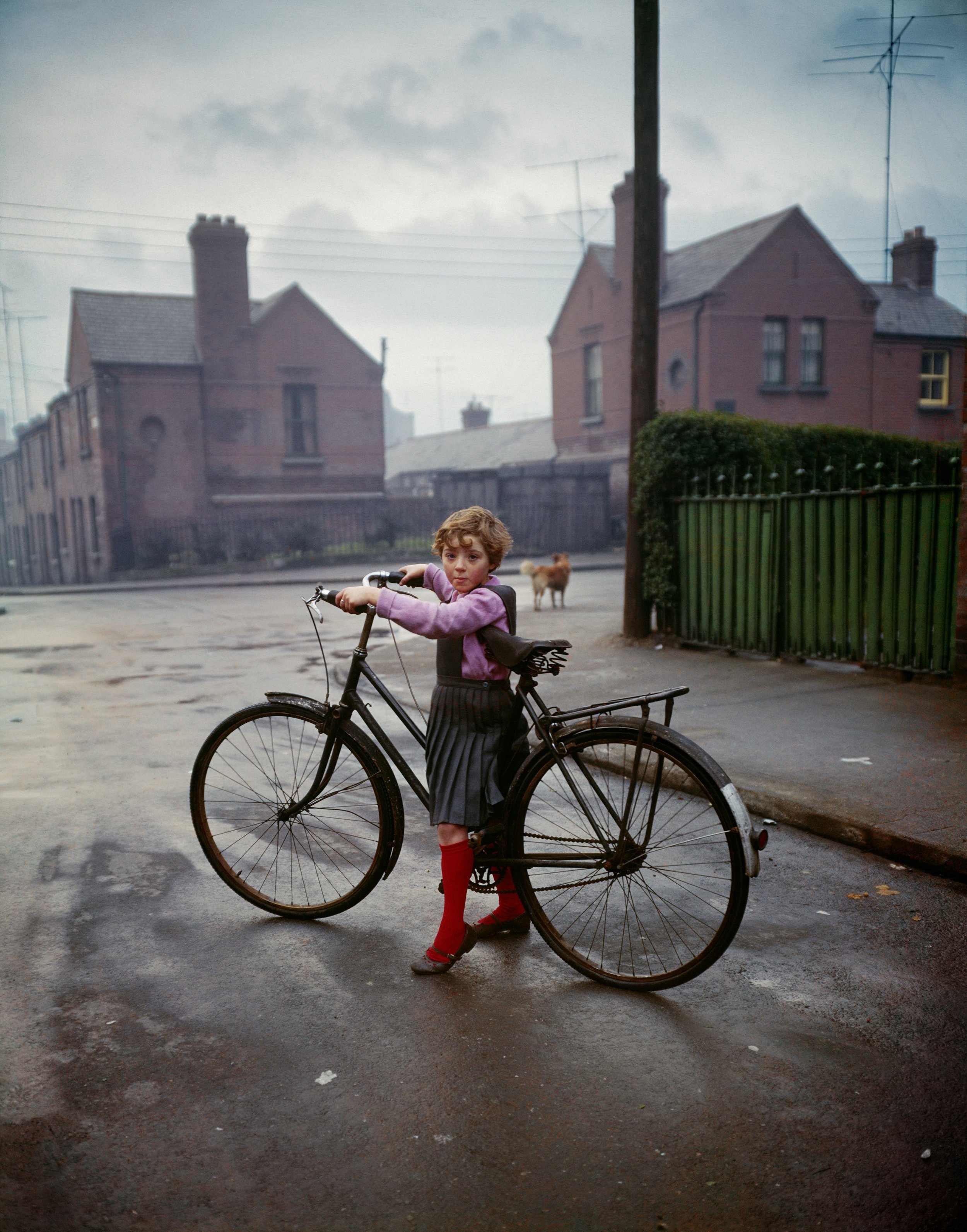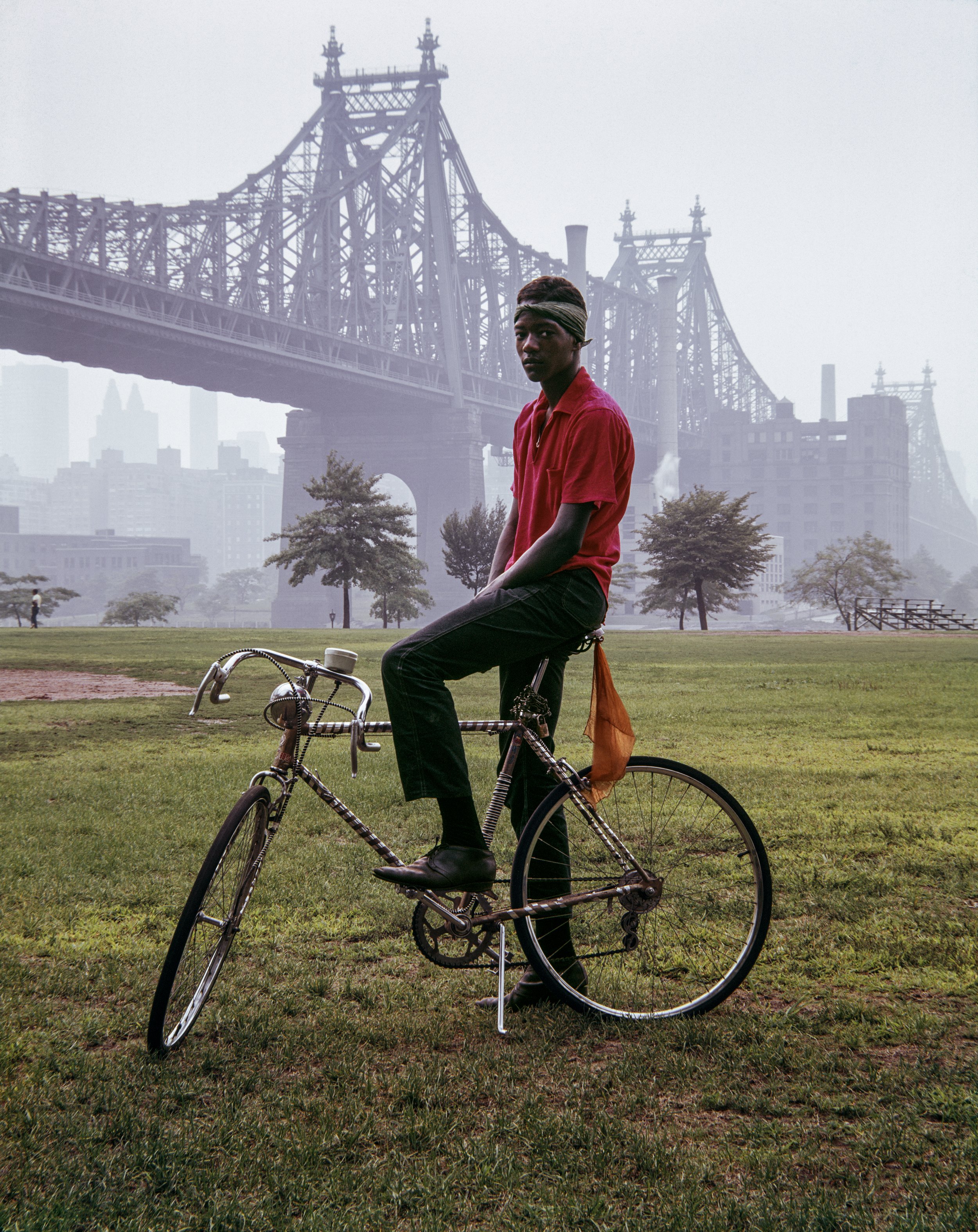Evelyn Hofer | The Photographers’ Gallery
Girl with Bicycle, Dublin, 1966
© Estate of Evelyn Hofer
Courtesy Galerie m, Bochum, Germany
Written By Nicole Miller
The Photographers’ Gallery presents the first UK solo exhibition of the German-American portrait and documentary photographer Evelyn Hofer. Using a large format four-by-five-inch camera set on a tripod, Hofer photographed her subjects with diligence, thoughtfully composing street portraits, landscapes, and still lifes. She also mastered the technically intricate dye transfer printing process, giving her more command over the color balance of her photographs. Most of Hofer’s direct yet sensitive compositions investigate class structure through a sociological lens to reveal the sentiments and identities of communities across European and American cities in the mid-late twentieth century. Evelyn Hofer offers audiences an exploration into the socioeconomic conditions of the past while preserving a quality of timelessness, prompting viewers to engage with Hofer’s analysis of the twentieth century to inform present-day anxieties.
Queensboro Bridge, New York, 1964
© Estate of Evelyn Hofer
Courtesy Galerie m, Bochum, Germany
The image above depicts a young man posing on his bicycle in front of the Queensboro Bridge in New York. He gazes quietly into the camera, seemingly apathetic to the imposing backdrop of the bridge and hazy cityscape. He complies with the lens, yet it looks as if his mind is preoccupied. Although there is a gentle stillness to his manner, the audience can sense he still has a day to get on with. Despite the beauty of the setting, the viewer desires to learn more about the subject’s story. When Hofer captured the photograph in 1964, New York City was experiencing a dynamic expansion of cultural diversity and ethnicity, juxtaposed with a mounting wave of political unrest. During the Harlem Riot that occurred in the same year, more than 100 people were injured and 465 people were arrested for protesting police brutality after a 15-year-old Black boy was shot and killed by a police lieutenant. The historical context of the photograph is integral to understanding its value, as we must remember that the tumultuous political climate looms uneasily in the background.
Warehousemen and Foreman, London, 1962
© Estate of Evelyn Hofer
Courtesy Galerie m, Bochum, Germany
Secretaries in Rawlings Park, Washington, 1965
© Estate of Evelyn Hofer
Courtesy Galerie m, Bochum, Germany
Through her photographs, Hofer highlights communities that are often misrepresented, including the working class and women. She shot working men and women throughout many major cities in the 1960s, such as warehousemen in London and secretaries in Washington. The subjects are composed and appear at ease, confident, and comfortable in their skin. Both images feature sets of four people, forming two groups that allow their similarities to form a common identity in each photograph. This emotional bond is reflected in the subjects’ physical closeness to one another. The warehousemen stand side-by-side in a group, hands in their pockets, all turned towards the camera, inviting Hofer and the audience into their huddle. The secretaries are also closely packed, as two of the women’s arms touch, and another’s arm is slung around the bench they are seated at, relaxed despite the proximity. Hofer presents these men and women as not only co-workers but friends. Additionally, their matching style of dress reinforces their collective identities. The foreman and the warehousemen wear hats and suits, and the secretaries wear fashionable, elegant shift dresses. Although these photographs exude 1960s trends, they evoke a universality that audiences can embrace. Evelyn Hofer illustrates that we can find commonalities between photographs of the past across many nations, connecting different parts of the world despite location and time.
Phoenix Park on a Sunday, Dublin, 1966
© Estate of Evelyn Hofer
Courtesy Galerie m, Bochum, Germany












